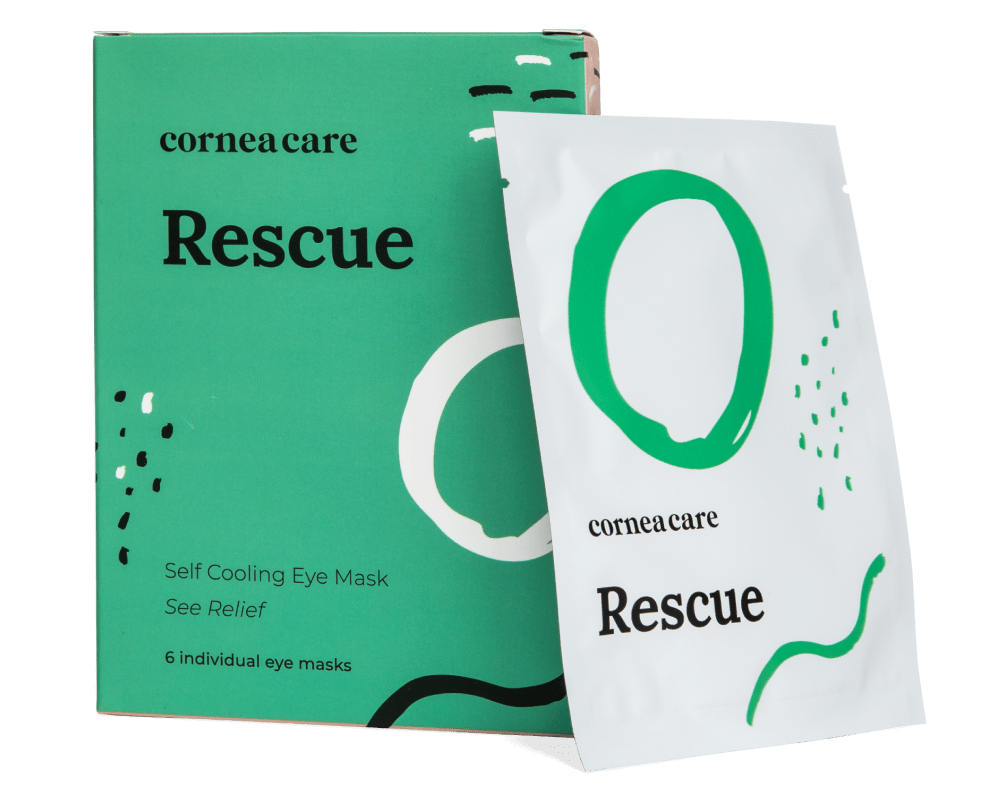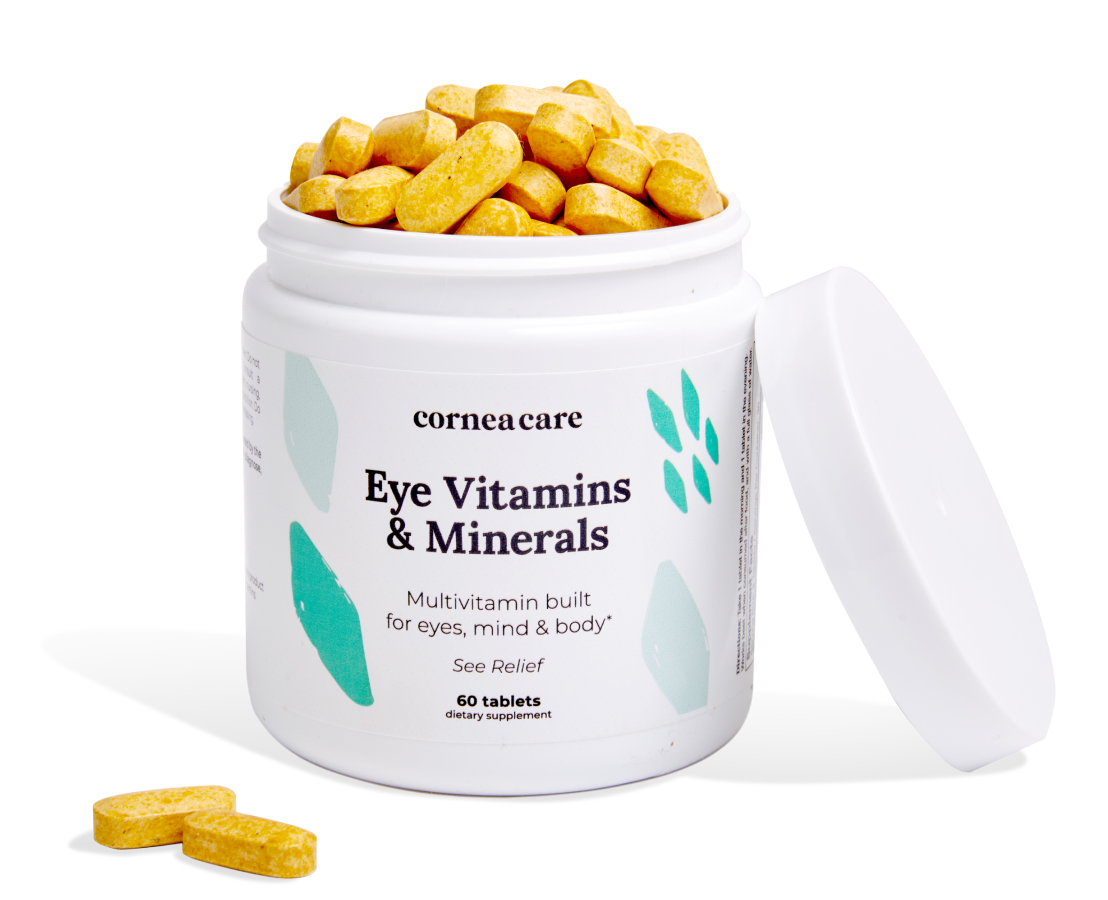Thyroid eye disease is a condition that can develop in individuals with thyroid disease, particularly those with Graves’ hyperthyroidism. With this condition, the immune system attacks and damages the muscles and tissues surrounding the eyes. This can result in a range of symptoms, including redness, dryness, itching, or a gritty sensation in the eyes.
As the condition progresses, inflammation may occur, which can lead to difficulty moving or closing the eyes. In severe cases, thyroid eye disease may cause vision loss, although this is rare. It’s important to work closely with a healthcare provider to manage thyroid eye disease and minimize its impact on eye health and overall well-being.
In this article, we’ll look at Graves’ disease and Graves’ hyperthyroidism, how they relate to thyroid eye disease, and natural treatments that may ease your symptoms.
Key Points
- Graves’ disease is a common cause of hyperthyroidism, a condition where the thyroid gland produces too much thyroid hormone.
- People with Graves’ hyperthyroidism may develop thyroid eye disease.
- Natural treatments for thyroid eye disease include supplementation and eye exercises.
moisturize your skin,
what about your eyes?
Graves’ Disease and Graves’ Hyperthyroidism
Before we talk about natural treatments for thyroid eye disease, let’s look at the conditions that can be the underlying root cause. While Graves’ disease and Graves’ hyperthyroidism are not exactly the same, they are closely related.
Understanding Graves’ Disease
Graves’ disease is an autoimmune disorder and a common cause of hyperthyroidism. Hyperthyroidism, also known as overactive thyroid, is a condition in which the thyroid produces too much thyroid hormone.
However, not everyone with Graves’ disease will have hyperthyroidism. In some cases, the thyroid gland may be damaged or destroyed by the immune system, leading to hypothyroidism, a condition in which the thyroid gland produces too little thyroid hormone.
Women under the age of 40 have a higher likelihood of developing Graves’ disease as well as people with other autoimmune disorders such as rheumatoid arthritis.1
Understanding Graves’ Hyperthyroidism
Graves’ hyperthyroidism is the overproduction of thyroid hormones caused by Graves’ disease. Though there are other factors that may lead to the condition, Graves’ disease is a common cause of hyperthyroidism.1
The thyroid gland is controlled by the thyroid stimulating hormone (TSH) produced by the pituitary gland in the brain. When the thyroid gland produces too much thyroid hormone, the levels of TSH in the blood decrease. These important hormones regulate a number of endocrine functions in the body.
Hyperthyroidism is diagnosed through tests that measure levels of thyroid hormones and TSH in the blood. Graves’ hyperthyroidism is a chronic condition, which means that it may require ongoing management. There are several treatment options available, including medication, radioactive iodine therapy, and surgery.
Symptoms of Graves’ Hyperthyroidism
With Graves’ disease, the immune system produces antibodies that stimulate the thyroid gland to produce excess thyroid hormone. This results in the characteristic symptoms of hyperthyroidism, such as weight loss, fatigue, tremors, and an irregular heartbeat.
Additionally, the symptoms of Graves’ disease may include:2
- Nervousness or anxiety
- Heat intolerance and sweating
- Changes in menstrual patterns
- Goiter (enlarged thyroid gland)
- Skin thickening, especially of the shins and top of feet
- Muscle weakness

Rescue
Cold Compresses
Perfect for sudden flare-ups of eye dryness, pain, burning, and swollen/inflamed eyelids. Free shipping 📦.
Try today - $12
Graves’ Hyperthyroidism and Thyroid Eye Disease
Thyroid eye disease (TED), also known as Graves’ ophthalmopathy, is an autoimmune condition closely linked to Graves’ hyperthyroidism. In fact, TED is often seen in people who have Graves’ hyperthyroidism, although it can occur in people with other thyroid conditions or even in people without any thyroid problems.1
Not everyone with Graves’ hyperthyroidism will develop TED, and the severity of TED varies widely from person to person. However, if you have Graves’ hyperthyroidism, it’s important to report any eye-related symptoms to your doctor. Early diagnosis and treatment can help prevent long-term damage and improve outcomes. During an eye exam, your optometrist or ophthalmologist will look for swelling and enlargement of the eye muscles.
Symptoms of Thyroid Eye Disease
In thyroid eye disease, the immune system produces antibodies that attack the tissues around the eyes, including the muscles, fat, and connective tissue. This can cause inflammation, swelling, and scarring in the tissues, leading to a range of eye-related symptoms.
The symptoms of thyroid eye disease can include:1
- Bulging eyes
- Swelling or redness around the eyes
- Gritty or dry sensation in the eyes
- Sensitivity to light
- Double vision or blurred vision
- Eye pain or discomfort
- Difficulty moving the eyes
- Eyelid retraction or drooping
- Loss of vision (in rare cases)
Thyroid Eye Disease Risk Factors
Individuals with Graves’ disease have a higher risk of developing thyroid eye disease. In fact, studies suggest that up to 50% of people with Graves’ disease may experience symptoms related to thyroid eye disease.3 However, most hyperthyroid patients will not develop thyroid eye disease or only experience mild symptoms.
Thyroid eye disease is a rare disorder, affecting approximately 19 in 100,000 people annually. Risk factors include genetics, lifestyle, and environment. Smokers have a higher incidence of thyroid eye disease, and the more you smoke the higher the risk. Stress can also contribute to a worsening of TED symptoms, as well as having radioactive iodine treatment.4
Treatment Options for Thyroid Eye Disease
Treatment for thyroid eye disease depends on the severity of the symptoms and the stage of the disease. In mild cases, thyroid eye disease may be managed with over-the-counter artificial tears to help alleviate dryness and irritation.
For more severe cases, medications such as corticosteroids, immunosuppressants, and biologics help reduce inflammation and manage the immune system. Your healthcare provider may recommend Tepezza (teprotumumab-trbw), the only thyroid eye disease medication approved by the Food and Drug Administration (FDA).4
In some cases, surgery may be necessary to correct more severe eye-related symptoms, such as double vision or bulging eyes. Surgical interventions may include orbital decompression surgery or muscle surgery.
Work closely with your healthcare provider to ensure you receive the most effective treatment and minimize side effects.
Natural Treatments for Thyroid Eye Disease
In addition to medical treatments, there are natural treatments for thyroid eye disease that may alleviate symptoms and improve overall eye health. Consider making the following lifestyle changes:1,5
- Quitting smoking can lower your risk of developing thyroid eye disease, reduce symptoms if you have the condition, and improve your health in general.
- Placing cool compresses on your eyes as needed during the day, and before sleeping at night, can reduce swelling and irritation.
- Using lubricating eye drops, also known as artificial tears, can ease irritation and discomfort by moistening and soothing dry eyes.
- Eating a healthy diet rich in fruits, vegetables, and lean proteins and taking CorneaCare multivitamins, specially formulated to support eye health and fill nutritional gaps in your diet, can be beneficial.
- Wearing dark sunglasses can help reduce your eyes’ sensitivity to light, and trying glasses with prisms or an eyepatch may help to fix double vision.
- Raising the head of your bed can reduce swelling and eye bags as you sleep.
- Taking steps to prevent dry eyes such as starting a regular eyelid hygiene routine, redirecting the airflow from fans and vents away from your eyes, and using a humidifier.
- Eating omega-3 fatty acids found in fatty fish, flaxseeds and walnuts, or taking omega-3 supplements, may reduce inflammation in the eyes.
- Getting more vitamin D from sun exposure, fortified foods, and supplements has been shown to help regulate the immune system in people with autoimmune diseases.
- Adding selenium supplements to your diet, an important mineral for thyroid health that may reduce inflammation and support the immune system. Good dietary sources of selenium include Brazil nuts, tuna, and sunflower seeds.
These natural treatments for thyroid eye disease may be helpful in managing your symptoms, however, they should not replace medical treatment from your healthcare provider.

Multivitamin
Eye Vitamins & Minerals
A single multivitamin to address the nutritional needs of your eyes, mind and body. 📦 Free shipping.
Try today - $35
Dry Eyes and Thyroid Eye Disease
Dry eyes can occur in thyroid eye disease for several reasons. In some cases, the inflammation associated with the disease can cause a reduction in tear production, leading to dryness. Additionally, exposure of the eyes due to lid retraction can cause increased evaporation of tears, further contributing to dryness.
CorneaCare artificial tears can replenish the moisture in your eyes and reduce the symptoms of dry eye syndrome. These drops can be used as frequently as needed, and many people find that using them several times a day is helpful. It is important to choose eye drops without preservatives to avoid irritation and damage to the cornea.6
Thyroid Eye Disease FAQs
Who is most at risk for thyroid eye disease?
Thyroid eye disease is most commonly associated with Graves’ disease, an autoimmune disorder that affects the thyroid gland. Therefore, individuals with Graves’ disease are at the highest risk for developing thyroid eye disease. However, thyroid eye disease can also occur in people with other thyroid disorders or in those with no thyroid abnormalities. Other risk factors include smoking and being a woman around the age of 40.
Can thyroid eye disease be cured?
Thyroid eye disease cannot be cured, but its symptoms can be managed and treated. The condition may improve on its own over time or with treatment, but some degree of residual symptoms may persist. It’s important to work closely with your healthcare provider to develop a treatment plan to alleviate symptoms and improve overall eye health.
What vitamins and supplements are good for thyroid eye disease?
Research has shown that supplementation with selenium and vitamin D is beneficial in the management of thyroid eye disease. Omega-3 fatty acids and turmeric also have anti-inflammatory properties that may help reduce the swelling of thyroid eye disease.
How can I reduce my thyroid eye disease naturally?
There are steps you can take to reduce thyroid eye disease naturally. Start by quitting smoking and adding more fruits and vegetables to your diet. Vitamin and mineral supplements can also be beneficial. Sleep with your bed raised to reduce swelling and a humidifier to reduce dryness. Use artificial tears to soothe dry eyes, cool compresses to reduce swelling, and wear sunglasses to protect your eyes from sun and wind.
Putting It All Together
While thyroid eye disease can be challenging to deal with, you can live a full and healthy life with this condition.
The treatment of thyroid eye disease is highly individualized and the most appropriate treatment approach will depend on the severity of symptoms, the stage of the disease, and your overall health and medical history. Take steps to make beneficial lifestyle changes and incorporate natural treatments for thyroid eye disease to support your quality of life.
What’s Next
Learn more about natural eye-healthy diet and lifestyle changes on our eye health and wellness blog!





